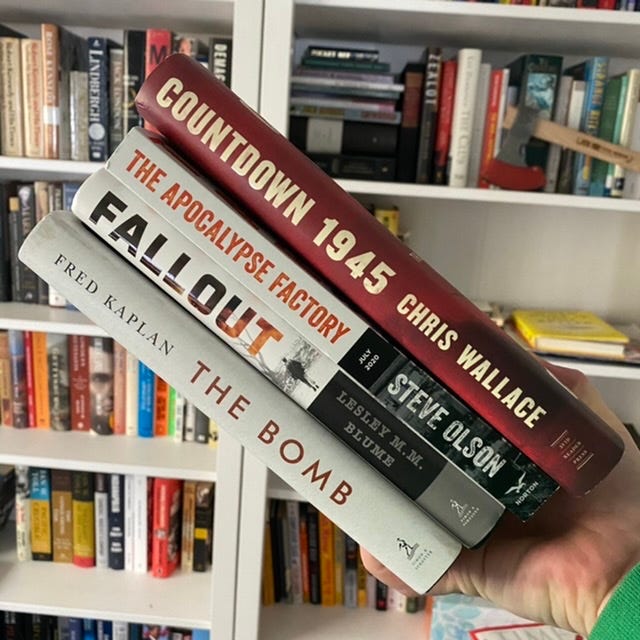What to Read Next (No. 172): wartime presidents
Last week I wrote about a couple of fictional battle-heavy books. This week, let’s look at a couple non-fiction titles that are primarily about the leadership aspects of battle.
First up is Bush by Jean Edward Smith. Though I finished the presidential reading project back in January, there are a handful of titles I have yet to cover here in the newsletter.
Then I’ll give ya my glowing review of Countdown 1945, which is a remarkable narrative story about the creation and use of the atomic bombs on Japan in World War II.
Let’s jump in.
Bush by Jean Edward Smith
Published: 2016 | Pages: 660
There’s no doubt that Smith (1932-2019) is one of the great biographers to have ever lived. Though just a small slice of his impressive bibliography, Smith’s books on Ulysses Grant, FDR, Dwight Eisenhower, and George W. Bush are all counted as being among the best biographies on those particular men. Smith is known for being even-handed, remarkably readable (a hard task for a 700-page book), and focused on the central narrative and defining character traits of those he studies.
Bush, then, is a little bit of a surprise because of the clear derision Smith shows for his subject. Particularly in the introduction and in the final chapter, the author makes historical judgments which, frankly, seem out of place for a POTUS who’s not only still alive, but just a decade and a half out from holding the office.
Interestingly, though, if you take away those two bookend chapters, the core of the narrative is no less than required reading for modern Americans. In my opinion, this is especially true for us Millennials, whose entire adults lives have been shaped by 9/11 and the subsequent wars that started under Bush’s watch.
We start the book, of course, in Texas. Much of Bush’s leadership style is formed by the very nature of his residence and governorship of that state, which is largely a hands-off and delegation-heavy position. That experience carried over into being president, too. When it came to our wars in the Middle East, Bush handed off a lot of responsibility and decision-making to not only Dick Cheney, but others in his cabinet as well.
My overall impression, which may not be was Smith intended, was that Bush the man is likable, charismatic, well-intended, and even earnest in his desire to be a force for good in the world; Bush the executive leader, on the other hand, was not well-suited to that job and didn’t have the skillset needed to be a good wartime president.
Though the final take was not as balanced as I had come to expect from Smith, the opinion of one of the most well-informed authors and researchers of his era surely means something.
The Bush story is not over yet, but subsequent biographers will have to wrestle with Jean Edward Smith’s judgments.
Countdown 1945 by Chris Wallace

Published: 2020 | Pages: 280
“Harry Truman prided himself on his ability to make a decision. But no one had ever had to make a decision like this.”
Just 116 days before Harry Truman made one of the hardest decisions an American president has ever made, he was playing poker with some buddies in a small, smoky room. He’d been Vice President just 82 days. Somewhat abruptly, Truman was called to the White House for an urgent meeting. He knew in his gut what was happening: FDR died and Truman knew hardly anything about the WWII effort.
One of the first meetings he took was to get up to speed on the efforts at Los Alamos. In one of the great secrets of world history, over 125,000 people were working towards creating a nuclear bomb which would end the war. Truman was astounded at the progress; the US was just months away from being able to use the weapon.
Wallace, with the pace of a thriller, brings the reader from Day 116 down to Day 0. Sometimes chronicling the story down to the minute, Wallace bounces between the Oval Office, the work at Los Alamos, unaware residents of Hiroshima, even the bomber pilots in the air in the minutes and seconds leading up to the dropping of the bomb.
We do also get to see some of the aftermath, not only in Japan but here at home too: “Americans learned as little as possible about the devastating effect of the atomic explosions . . . this was no accident.” As with many things about our past, we didn’t want to come to grips with what we had done. Thankfully, the enterprising journalistic work of John Hersey in The New Yorker (and later a book) changed that—Wallace, in fact, concludes that “It is impossible to overstate the impact of Hersey’s work.”
Truly every page is intense, many are jaw-dropping, and I had a hard time putting it down.
This isn’t a book for the armchair scholar. Wallace is not bringing new info to the story, but rather arranging the known pieces into a thrilling and novelistic narrative. If you want a good history story, Countdown 1945 is a great title to reach for.
Thanks so much for subscribing. I really appreciate the support!
Please let me know what you’re reading—I love to hear.
One last thing. If you enjoy the newsletter, please consider sharing it or gifting a subscription:
-Jeremy


